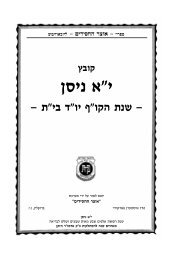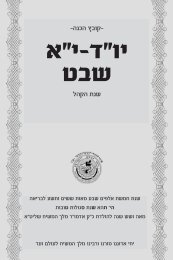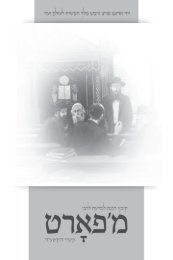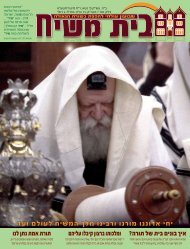You also want an ePaper? Increase the reach of your titles
YUMPU automatically turns print PDFs into web optimized ePapers that Google loves.
16Yosef says that the Hebrew names of the seven planetary influences (Shabtai or ‘Saturn’,Maadim or ‘Mars’, and so forth) together contain 28 letters (Orach Chaim, Siman 56).The 28 letters also correspond to the days of the month. The first verse in the Torah(Bereishis, 1:1) has seven words, corresponding to the seven days of the week, and it hastwenty-eight letters, corresponding to the days of the month (Da’as Z’kenim). This samepattern can be found with the words of revelation in the opening verse of the TenCommandments, “And G-d spoke all these words, saying” (Shemos, 20:1); here again,there are seven words and twenty-eight letters. Thus, when we say “Y’hei shmei…” weare praying that all these diverse influences in Creation, including the divisions andchanges within the flow of time, should be permeated by the revealed Divine Presence.In TaNaCh, the number 28 represents ‘change’. The book of Koheles (3:2-8) speaks oftwenty-eight seasons, in which ‘there is a time for everything’: “There is a time to bejoyous and a time to mourn, a time to speak and a time to be quiet, etc.”Change corresponds to a sense of separation and disunity. Thus, when we recite “Y’heishmeih…,” we are healing all the change and disunity in the world, and unifying it in theGreat Name of Hashem. A such, Kaddish helps heals the dramatic changes involved inour separation from our beloved departed.The number 28, written in Hebrew letters, spells the word koach, ‘strength’. This alludesto the advice of the Gemara, quoted above, that we are to recite “Y’hei shmeih…” with allour koach.When Moshe went up to Heaven to receive the Torah, Hashem asked him, “Is there noShalom from where you are coming?” This meant, ‘Do you come from a place wherepeople do not greet each other upon meeting?’ Moshe responded, “Does a servant evergreet his master?” Hashem told him “You should have helped Me. Tell me I shall besuccessful.” Then Moshe said, “So may the koach of Hashem be increased, as You havesaid” (Shabbos 89a; Rashi, ad loc). Again, the word koach, 28, alludes to Kaddish.
















